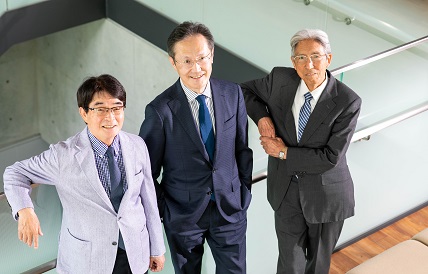CiNet is supported by the National Institute of Information and Communications Technology (NICT) – a government funded institute (via MIC) that has been at the heart of Japanese innovation and technology for over 100 years. In 2011, NICT launched CiNet as a major inter-disciplinary research initiative to exploit rapidly advancing insights into the brain, and to use this knowledge to develop pioneering new neuroscience-based technologies.

Toshio Yanagida was appointed director in 2011, leading a team of Japan’s most eminent scientists, including Shojiro Nishio (Information and Computer Science), Mitsuo Kawato (Neuroscience and Robotics), Shinro Mashiko (Information Technology, Physics), Masayuki Murata (Information and Network Science), Kazumasa Enami (Communications Technology), Kazuhiro Oiwa (Biophysics and Neuroscience), and Yoshichika Yoshioka (Imaging Technology). They formed CiNet as a collaborative venture with Osaka University and the Advanced Telecommunications Research Institute International (ATR). Seiji Ogawa, the inventor of fMRI, and Kunihiro Kato (Information Technology) were appointed chief scientific advisors.
Shigeru Kitazawa succeeded Toshio Yanagida as Director of CiNet on April 1, 2022.

On behalf of NICT, their goal was to forge a young and diverse team of the most innovative and imaginative scientists from a variety of disciplines to lead a new integrated program of neuroscience and technology research under one roof.
CiNet’s central research facility opened in April 2013. Several CiNet researchers also maintain laboratories on site at Osaka University, as well as at ATR (Kyoto) and NICT (Kobe). CiNet operates an additional neuroimaging facility at NICT Kobe.
Overall, CiNet’s core mission is the study of the information and neural network strategies used by living systems, including high level brain function, and implementation of these findings to artificial information and communications networks.
